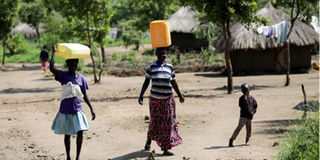Study: Female refugees in Uganda hardest hit by Covid-19

Women carry water at Rhino Camp, a South Sudanese refugee settlement area in Uganda on August 9, 2017. A fight between refugees and their host community at Rhino Camp in northern Uganda on September 11, 2020 was triggered by quarrels over a water source.
What you need to know:
- There are 1.4 million refugees in Uganda, with South Sudanese nationals making up more than 65 per cent of the population.
- Report titled “Inter-Agency Rapid Gender Analysis-Covid-19", released last week, indicates that refugees in Uganda, especially women and girls, have bore the greatest brunt of the pandemic.
- Covid-19 has exacerbated pre-existing gender inequalities and further marginalised vulnerable groups.
Refugees in Uganda have been hit hard by the Covid-19 pandemic, with women and girls paying a heavier price than their male counterparts, a report by the United Nations High Commissioner for Refugees (UNHCR) shows.
The report titled “Inter-Agency Rapid Gender Analysis-Covid-19", which was released last week, indicated that refugees in Uganda, especially women and girls, have bore the greatest brunt of the pandemic.
In the survey commissioned by UNHCR, UN Women in partnership with the Government of Uganda, Care International, the Danish Refugee Council, International Rescue Committee, Oxfam, Over Comers Women Group and Transcultural Psychosocial Organisation, sought to understand the impact of Covid-19 on women, girls, men and boys of different backgrounds.
Increased cases of GBV
Based on household surveys with over 1,500 refugees in Kampala and the informal settlements as well as interviews with 185 key informants, the assessment found that women and girls have been highly impacted in many aspects of their lives, including livelihoods, education, healthcare and protection risks.
The loss of income within the household has contributed to increased incidents of gender-based violence (GBV) and negative coping mechanisms such as survival sex.
The survey found that 53 per cent of girls and 46 per cent of women aged 18-24 years reported an additional unpaid work burden such as cooking, housework, collecting firewood and fetching water.
About 10 per cent of key informants cited child marriage as one the negative coping strategies families were forced to resort to make up for lost livelihoods.
Teenage pregnancies
Joel Boutroue, UNHCR Representative to Uganda, in a press statement said whilst sparing no one, Covid-19 has exacerbated pre-existing gender inequalities and further marginalised vulnerable groups.
“Since the start of this pandemic, we have been working closer with the refugee communities to identify and assist those most in need,” said Mr Boutroue.
The report also underlines the challenges to the education of refugee boys and girls as schools remained closed following a directive imposed by the government to reduce the spread of coronavirus.
It revealed 40 per cent of children did not have materials for distance education or had to stop learning altogether. The need to carry out household chores affected the learning of 27 per cent of girls and 13 per cent of boys.
It also highlighted a strong correlation between the closure of schools and the increase in teenage pregnancies at 21 per cent and child marriage at 18 per cent, leading to school dropout and other devastating health and social consequences for girls.
Dr Maxime Houinato, UN Women Country Representative, said literacy levels for women and girls have been always low compared to men and boys, with a higher dropout amongst girls, but this has been exacerbated by the Covid-19 pandemic.
“To counteract the impact of Covid-19, second chance education opportunities are key to enable women and girls to access education,” said Dr Houinato.
He added that it is critical that economic empowerment programmes are scaled up to help improve participation, reduce violence against women and enhance positive coping mechanisms.
1.4 million refugees
More than 54,000 refugees in Kampala received mobile money to pay rent and buy needed commodities. In the refugee settlements, more than 1,500 refugee tailors were hired and paid to produce face masks for distribution to fellow refugees, providing an income to thousands of families.
UN Women has supported refugees across five settlements in Adjumani, Arua, Kiryandongo, Kyegegwa and Yumbe to access Mental Health Psychosocial Support (MHPSS), enabling them to cope better with the traumatic experiences, in addition to providing refugees with legal aid service.
Uganda hosts over 1.4 million refugees, with South Sudanese nationals making up more than 65 per cent of the refugee population.
Majority of them live in settlements sprawling across Uganda, while six per cent have settled in Kampala.
Uganda has confirmed 20,714 Covid-19 cases as of December 1, 2020, including 255 refugees. The Ministry of Health has reported 205 deaths to date, including five refugees.





